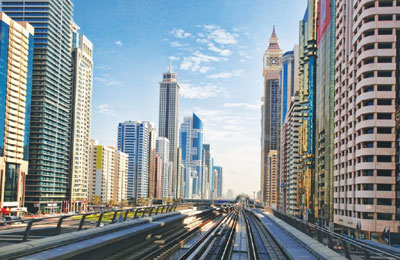
Dubai property market back on its feet
DUBAI, June 6, 2016
The real estate market of the UAE has had its ups and downs in the past. The global housing market crash of 2008 had dented sentiment in Dubai’s then rapidly rising realty sector as well, but thanks to the authorities’ resilience and farsightedness, the rebound was just as strong, said a report by UAE property portal Bayut.
During the first few months of 2013, Dubai’s real estate market started picking up and so fast was the recovery that in nearly a year, the market was back on its feet and properties in Dubai Marina were already touching their 2008 pre-crash values.
Seeing the rising interest of investors, Dubai’s government architected a new strategy to steer the market clear of overheating, it stated.
The authorities doubled the property registration/transfer fees and laid a slab on mortgage lending. This effectively phased out property flippers from the market and ushered in an era of a healthy price correction, it added.
At the onset of 2016, Abu Dhabi introduced a new set of property laws that have empowered property buyers like never before. The law has made escrow accounts mandatory and given investors/buyers the option of cancelling purchases and demand refunds in cases of “substantial prejudice”.
The developers have been prohibited from collecting registration fees from investors and are only allowed to launch an off-plan project if they prove the ownership of land where they intend to construct the project, said the report.
This will ensure buyers get what they pay for. Also imposed has been a 10-year building liability on developers, making them legally responsible to fix any defects that manifest 10 years after handover, it stated.
The Department of Municipal Affairs has also been empowered to fine developers to compensate purchasers where a project has been delayed beyond six months, the report added.
According to Bayut, the UAE’s economy is diversifying and continuously moving away from its dependency on oil.
A prominent example of this could be seen in Dubai, which has less than five per cent reliance on oil presently and its real estate, hospitality, financial services and logistics sectors are growing stronger by the day.
The apartment rental yields in Dubai and Abu Dhabi averaged six and seven per cent respectively, in the first quarter of 2016, while the returns went high as 10 per cent when considered individual bed categories and various residential localities, it stated.
The rental returns, which remain better than those in many important cities around the world, have given a continuous impetus to investors to park their money in UAE’s realty sector, said the report.
Both Dubai and Abu Dhabi happen to be formidable competitors in the passenger, freight and cargo handling business - their superior air and sea traffic-handling abilities making the country one of the world’s biggest re-exports markets.
Another positive to take home is the fact that while other oil exporting countries in the region have been forced to introduce spending cuts and fiscal interventions, Dubai’s latest budget forecasted an increased 12 per cent spending on social uplift and infrastructure projects, said the UAE property portal.
Also, Dubai recently approved infrastructure projects worth Dh7 billion ($1.9 billion) for the coming years. The Ministry of Infrastructure Development has also been allowed to construct new residential complexes, roads, schools, health centres and government buildings across the UAE, it stated.
Authorities have also approved Dh5 billion ($1.3 billion) for citizen accommodation projects which would provide housing solution to 42,000 people in the next five years.
On the future outlook, Bayut said the growing economic sectors will not only drive demand in the real estate market, but also bring work opportunities for thousands of people associated with various industries.
Dubai, it stated, was expecting its population to rise by one million over the next five years and these sanctioned projects will help in accommodating the massive influx of households that will settle in the expanding city.
And also added to that the UAE has the unique advantage of playing host to the next world expo in 2020, stated the report.
The exposition in itself is a great driver of growth and changing the country’s economic fortunes for the better. The signals coming out of UAE are indeed positive, what is needed is the keen mind that can decipher them well, it added.-TradeArabia News Service







